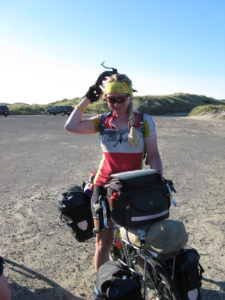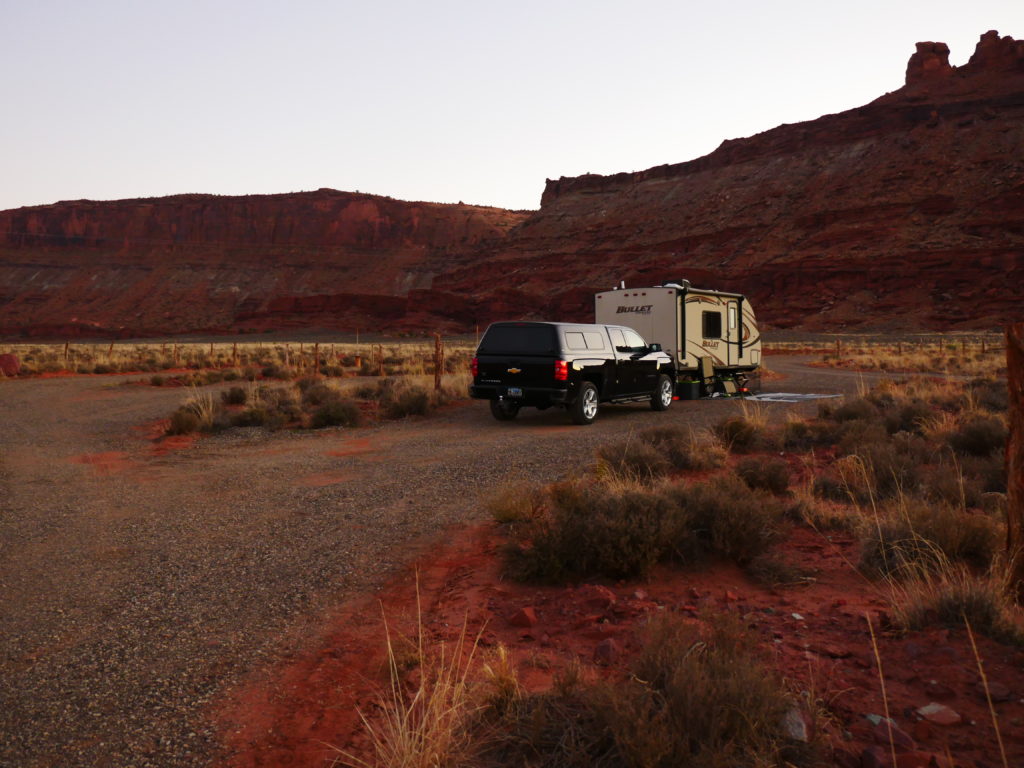
Yesterday afternoon, I was editing a couple chapters of my book on my transamerica bike ride, much of which I completed alone. I began to think back on how often strangers expressed concern for my safety during the times I was by myself. Here I was, a young woman on a fully loaded touring bicycle, riding and camping alone – I may as well have a flashing bulls eye hovering above me at all times, right?
Not quite. I wasn’t traveling with a weapon when I rode, and honestly, there wasn’t a time when I wished I had one. The weather spooked me on a few occasions (we’re talking serious, gnarly storms that I weathered in my tent or roadside ditches). I heard a raccoon rummaging in a nearby trashcan one night while I was camping, and that scared the shit out of me. But I never had any unfriendly experiences with people during the entire 4,000+ miles I rode from Virginia to Oregon.
When I set out to do RV travel around the country – as a solo woman – I didn’t have any fears regarding my safety. I mean really… this feels like traveling in a fortress compared to bike camping. I do carry a gun, but truly, I have that to protect myself from wild animals at night when I’m in relatively remote places. I’ve never had a concern about animals or people – the gun is just there, tucked away, as a safety blanket. The only experiences I’ve had in the RV so far that have made me uncomfortable have been related to maneuvering in tight places or driving unfamiliar, twisting mountain roads (and really, that becomes less of a thing the more time I spend behind the wheel – I left Florida with virtually zero towing experience).
So, based on my experiences, I believe it is absolutely safe for women to travel alone. In fact, I strongly encourage it. Your strongest safeguards will always be your intuition. If something feels wrong, exit the situation. I’ve pulled into camping spots a couple of times now, both on the bike and in the RV, and left because something just felt amiss. Whether it had to do with the actual location or the vibes I was getting from the people who were there, it didn’t matter. When my warning bells go off, I listen – it’s nothing to freak out over. Intuition, especially for women, is a very powerful tool. Use it.
With all that said, I have a few safeguards in place that I wanted to share. I don’t believe the road is dangerous or that people are out to get me in any way, but these are little things anyone can do (male or female), to help boost the safety of traveling alone.
- Scout campsites. Scouting sites can be tricky, especially if you’re going off grid and you don’t know the area. If you’re towing, unhook and scout areas in your truck before dragging your fifth wheel or travel trailer down a road you don’t know. Google maps are not updated frequently enough to give you reliable information on whether a road has a spot you can use to turn around in an RV, and it certainly won’t reveal whether a road is peppered with holes, sand, water, or other hazards that could get you stuck or cause damage to your rig. If you can’t unhook and scout (if you’re in a motorhome, for example), or you don’t have a toad you can use, find a spot to park and then walk the road to scout campsites. I cannot stress this enough – if you’re unwilling or unable to scout a site before you drag your rig down forest service roads, find a different place to camp. The last thing you want is to be stranded, alone, in a spot you don’t know.
- Listen to your instincts. As I already mentioned, this is the single most important piece of safety advice for any solo traveler. Always, always, always listen to your intuition. If something doesn’t feel right, don’t question your feelings or waste time trying to analyze them – get out. Even if you feel ridiculous, never question your instincts.
- Install a magnet door alarm. A simple, cheap way to make your RV a little safer is to install a cheap magnet-based alarm on the door(s) of your rig. Mine has a little remote that hooks to my key chain so I can arm or disarm it from about 20 feet way. These little things are LOUD. I’ve only actually set mine a couple of times when I was in areas where there were a lot of people and an alarm could draw attention from others or scare off an invader (for example, when over-nighting in a Walmart parking lot or rest area) .
- If your RV is a fifth wheel or travel trailer, strategically park your truck at night. I always unhook my trailer and park my truck so that the headlights are pointed toward the rig. I have an outdoor light on the trailer, but it’s nowhere near as bright as the LED headlights on my truck. If I need to exit the trailer in the middle of the night (for example, to let Lola out), I unlock the truck remotely, which then causes the headlights to come on for a full minute. I’ll unlock/relock to keep the lights on so I can see all around the rig while I’m out at night. This is a simple thing that I always do and it really helps at night.

I park my truck so I can use the headlights to light up my campsite at night, if needed. - IF you choose to arm yourself, know your gun. If you decide to carry a gun, make sure you’re familiar with it. A gun is useless (and even creates a risk of being used against you) if you don’t know how to hit what you’re shooting at. Be comfortable with your gun, clean it, and go to the range on occasion so you don’t get rusty – if you’re unwilling to do these things, don’t carry. Also, be aware of the different gun laws in the states you travel through.
- Keep your cell phone charged – be aware of dead spots. Always keep your phone charged and know that there will likely be times when you have no signal. If you travel out west, Verizon has the best coverage. Many RVers travel with two phones – one AT&T and one Verizon to ensure they have the best coverage no matter where they’re at. I do something similar – my cell phone is through AT&T and my hotspot device is through Verizon. If I need to make a call when I have Verizon coverage but no AT&T, I use VOIP such as Whatsapp, Facebook, or Facetime audio (if I’m calling another iPhone user.)
- Sign up for roadside assistance. AND, make sure your RV is covered. I have roadside assistance for my truck through Chevy, but that would be of no use if something happened to my RV. Thus, I made sure the insurance policy for my RV included roadside (read the policies closely, look at deductibles and limits for costly services such as towing).
- Get a dog. If you don’t have a four-legged friend, go adopt one 🙂 Dogs are the best warning bells. Although a big dog will have a more intimidating bark and presence, smaller dogs are also wonderful for alerting you to things.
I’m sure I’ll continue updating this list as I think of more safety tips. When you travel solo, you’re guaranteed to get pushed out of your comfort zone, but that doesn’t make it dangerous. You’ll also open yourself up to some truly amazing experiences in the process…if you dare.